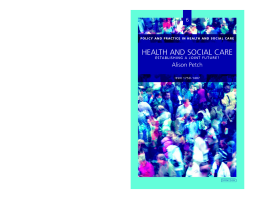
Additional Information
Book Details
Abstract
Recent years have witnessed accelerating demands from Governments throughout the United Kingdom for closer working between health and social care agencies. Policies have ranged from permissive strategies encouraging consultation and joint planning to legislation requiring the pooling of funds and creating single agency responsibility. Partnership working across health and social care is one of the areas where the most distinctive differences have emerged between Scotland and the rest of the United Kingdom and this divergence provides the focus for this volume. A specific Scottish Executive initiative, the Joint Future Agenda, has focused on meeting adult support needs through effective joint working. The report of a Ministerial Joint Future Group in 2000, Community Care: A Joint Future has provided the foundation for subsequent community care initiatives. This book explores the details of this initiative in the context of what is known about the impact and effectiveness of integrated working.
Table of Contents
| Section Title | Page | Action | Price |
|---|---|---|---|
| Acknowledgements | |||
| Glossary | |||
| Executive summary | |||
| 1. Introduction | |||
| 2. Poverty in Ethiopia | |||
| 3. Health status of the poorest communities | |||
| 4. Health-sector policy and planning | |||
| 5. Water and sanitation | |||
| 6. Food security | |||
| 7. Education status of the poorest communities | |||
| 8. Education-sector policy and planning | |||
| 9. Conclusions | |||
| 10. Recommendations | |||
| Notes | |||
| References and further reading | |||
| Appendix 1: Micro-research methodology | |||
| Appendix 2: Tabulated findings | |||
| Appendix 3: Case study 1. Cherkos, Kebele, Addis Ababa | |||
| Appendix 4: Case study 2. Yegurassa and Andaje, Delanta, North Wollo | |||
| Appendix 5: Case study 3. Ali Roba, Metta, Easten Hararge | |||
| Appendix 6: Case study 4. Belhare, Jijiga, Somali region |
